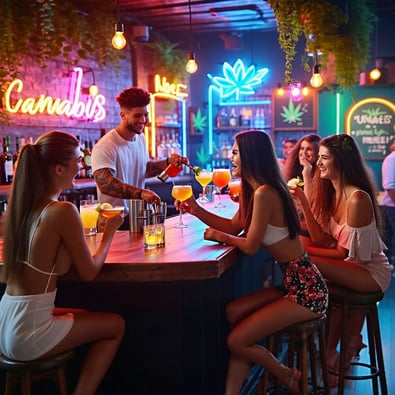The growing interest in living California sober has captured national attention, as more people seek a lifestyle that reduces alcohol use while incorporating cannabis in a controlled way. As conversations about wellness, harm reduction and substance use evolve, many are asking whether the science actually supports the claims behind being California sober. A new study offers fresh insight—and it’s sparking even more discussion among those exploring a California sober approach.
The "California sober" trend, which involves ditching alcohol in favor of cannabis, is gaining momentum, spreading from Hollywood to health influencers to homes across America. Among the motivations for many adopters is to reduce alcohol use, and a new study on the causal effect of cannabis on alcohol consumption suggests that smoking marijuana may lead people to drink less—in the short term.
Published in the American Journal of Psychiatry, the study by researchers at Brown University is the first randomized, placebo-controlled trial to test whether cannabis use directly changes alcohol consumption. Unlike previous research that relied on surveys or self-reported associations, this trial allowed scientists to measure cause and effect under controlled laboratory conditions.
The trial included 157 adults, aged 21 to 44, who drank heavily and used cannabis at least twice a week. Over three separate lab visits, each participant smoked cannabis cigarettes containing lower or higher levels of THC, the main psychoactive ingredient in marijuana, or a placebo.
Placebo-controlled trials, in which neither the researchers nor the participants know who receives the placebo or the actual drug, are considered the gold standard for establishing what drives behavior, according to Metrik, who is affiliated with Brown's School of Public Health and Warren Alpert Medical School.
After smoking, participants took part in what researchers called the Alcohol Choice Task, a well-established laboratory test of drinking behavior that the team conducted in a room designed to resemble a bar. Participants were offered servings of their preferred alcoholic beverage on a tray and could choose either to drink or to earn small cash payments for each drink they declined.
The payments were deliberately small to provide a subtle alternative to drinking without meaningfully swaying participant choices. During each two-hour session, participants were provided with enough alcohol to raise their blood alcohol level to about 0.10%, which is above the legal intoxication limit in many states.
The researchers found that when the participants smoked the cannabis with THC, they drank less alcohol than when they smoked the placebo. For example, when the participants smoked the lower THC dose at 3.1%, they drank about 19% less than when they had the placebo. When they smoked the cannabis with the higher THC dose at 7.2%, they drank about 27% less alcohol.
After smoking the cannabis with active THC doses, participants reported less immediate urges to drink than when they smoked a placebo cigarette. When they smoked the cannabis with the 7.2% THC dose, participants took significantly longer to take the first sip than when they were administered the placebo.
"We saw that cannabis reduces the urge in the moment," Metrik said. "What we don't know from this study is what is the long-term effect."
The researchers caution that the results of the study don't mean that cannabis should be recommended as a therapeutic substitute for alcohol. They emphasized that cannabis itself can be addictive and that—just as is the case for alcohol—there is risk of progressing to problematic use of cannabis, as well.
The authors also noted that it remains unclear whether the same reduction in alcohol use would hold up in real-world settings, where people drink socially or use higher-potency cannabis.
Excessive drinking is the third leading cause of preventable death in the United States and, according to the Centers for Disease Control, costs the United States an estimated $249 billion a year (for lost labor and lower worker performance, property damage, crashes and health care services for injuries). Cannabis use often overlaps with alcohol problems, with about 60% of people with cannabis use disorder also meeting criteria for alcohol use disorder.
The researchers said the risk that using cannabis may actually increase drinking is higher for people who tend to combine cannabis and alcohol to enhance the effects of each or if they use the substances together in social settings.
To address these factors, the team is conducting a new clinical trial that explores what happens when cannabis and alcohol are used together, not just sequentially—and how different cannabinoids like THC and CBD may influence alcohol consumption in the laboratory and under real-world conditions.
For now, the study provides preliminary evidence that cannabis may reduce alcohol consumption in the lab, but more study is warranted before cannabis can be considered a tool to help people cut back or stop drinking altogether.
"Our job as researchers is to continue to answer these questions," Metrik said. "We can't tell anyone yet, 'you should use cannabis as a substitute for problematic or heavy drinking.'"
As the California sober conversation evolves, this study highlights both the promise and the limitations of the approach. While many adopting a California sober lifestyle hope for harm reduction, the evidence remains early. Still, the dialogue around being California sober continues to grow, inspiring more research into why some people explore a California sober path and what long-term outcomes may look like.





